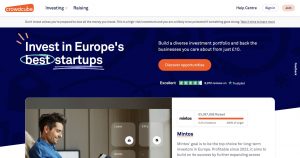10 Best Crowdfunding Sites For Startups in 2024
-
user
Finding funding for your startup can be a real challenge, and that’s where the best crowdfunding sites for startups come in. So, you’ve got a fantastic idea but an empty bank account? Enter crowdfunding – it’s about rallying a community behind your vision. However, not all platforms are created equal.
In this article, we’re sharing details on the top 10 crowdfunding sites for startups. These platforms don’t just open doors; they kick them wide open, ushering in a wave of opportunity for budding entrepreneurs like yourself.
Let’s not wait any longer and find the answer to ‘What are the best crowdfunding sites for startups?’
Crowdfunding Overview
What is crowdfunding?
Crowdfunding is a method of raising capital through the collective effort of individuals, typically via the Internet. It allows entrepreneurs, artists, and organizations to raise funds for projects, products, or causes by soliciting small contributions from a large number of people, often through crowdfunding platforms for startups.
In detail, crowdfunding platforms serve as digital hubs where startup founders can showcase their innovative projects, set ambitious funding targets, and entice potential backers. Moreover, they streamline the transaction process, ensuring that funds flow seamlessly from backers to startups.
What are the types of crowdfunding?
Within the realm of crowdfunding, startups encounter various avenues.
- Equity crowdfunding: For startups seeking to scale rapidly, equity crowdfunding presents an opportunity to secure investment by offering a share in the company’s ownership. This model aligns investors’ interests with the startup’s success, fostering a symbiotic relationship.
- Debt-based crowdfunding: Through peer-to-peer lending platforms, startups can access capital by borrowing from individual investors and committing to repayments over time. This avenue provides flexibility and autonomy, allowing startups to navigate their financial journey on their terms.
- Reward-based crowdfunding: By offering backers exclusive rewards or early access to products, startups can incentivize contributions and cultivate a loyal community around their brand. This approach is suitable for startups with innovative products or compelling stories.
- Donation-based crowdfunding: Startups can tap into the generosity of individuals who contribute funds without expecting tangible returns. This model often resonates with socially conscious startups or those championing noble causes.
How does crowdfunding work?
Crowdfunding backers receive incentives for their donations and support, including:
- Early access to purchase a product, potentially at a discounted price.
- The opportunity to pre-order a product and contribute to its development.
- Exclusive rewards, including ongoing discounts, elevated customer loyalty, or complimentary merchandise.
- Access to the founding team or fellow crowd funders.
- Equity stakes.
- Exclusive content.
In return for hosting your crowdfunding campaign, platforms charge platform, transaction, and payment processing fees.
While each crowdfunding site boasts unique features, fee structures, and user bases, the fundamental concept remains consistent: You present your project on the platform with a fundraising goal and a deadline, then rally support.
10 Best Crowdfunding Sites for Startups
What are your options for crowdfunding your business? Let’s explore some of the best crowdfunding sites for startups today to determine which is best suited for your next campaign.
Let’s dig in one by one.
#1. StartEngine

Type: Equity-based
StartEngine is one of the leading crowdfunding sites for startups in the US. According to its website, the platform has successfully raised over $650 million through a mix of Regulation and Regulation A+ crowdfunding, using its subsidiaries, StartEngine Primary and StartEngine Capital. Funding has been distributed across more than 500 startup offerings featured on its platform.
Pricing: A platform fee of 7% to 12% is charged, depending on the investment method and associated fees.
Pros of StartEngine
- Holds a respected reputation in the equity crowdfunding sphere
- Startup founders maintain control over their offerings
- Funding can be quickly collected upon reaching the $12,000 threshold
Cons of StartEngine
- Only available to US-based startups
- Maximum funding is capped at $50 million under Regulation A+ and $1.07 million under Regulation Crowdfunding
- Minimum funding goal is set at $10,000
Best for:
- Startups with a long-term vision
- Growth-focused startups
Why do I like StartEngine? StartEngine is attractive due to its user-friendly platform and extensive investor network. It stands out for its diverse investment opportunities across various industries and development stages.
#2. CircleUp

Type: Equity-based
CircleUp specializes in equity crowdfunding primarily for established and high-growth startups. Founded in 2011, CircleUp has facilitated funding for over 250 companies, totalling $390 billion. It connects these startups with accredited investors, using data-driven analysis to evaluate investment opportunities. This platform aims to support the growth of consumer brands by providing access to capital and resources for startups while offering investors the opportunity to invest in promising early-stage companies.
Pricing: Commission varies based on the amount raised
Pros of CircleUp
- Limited to accredited investors for funding projects, ensuring a higher quality of backers
- High success rate for campaigns
- A rigorous acceptance process increases the chances of reaching approved campaign funding goals
Cons of CircleUp
- The stringent application process may pose a challenge
- Limited to product-centric startups for fundraising opportunities
Best for
- High-growth startups
- Early-stage startups
- Consumer product startups
Why do I like CircleUp? This platform utilizes a technology known as Helio, which predicts promising companies poised for significant growth and untapped potential.
#3. Crowdcube

Type: Equity-based
Crowdcube shines as one of the best crowdfunding sites for startups in Europe, drawing upon a large and varied investor community. It provides avenues for investors from different backgrounds to engage in both fixed-income and equity investment models.
Featuring around 15-20 highlighted companies, Crowdcube offers in-depth insights into each listing. With its established reputation for success, Crowdcube serves as a reliable option for diversifying investment portfolios.
Pricing: 7% of the platform fee, along with a completion fee ranging from 0.75% to 1.5%
Pros of Crowdcube
- Access to promising startups with a low minimum contribution threshold
- The platform manages all paperwork and tax-related matters
- Businesses are obligated to provide quarterly updates to investors
Cons of Crowdcube
- Investors must meet specific qualifications as educated investors
Best for
- Early-stage startups
- Growth-oriented startups
- Europe-based startups
Why do I like Crowdcube? Crowdcube offers financing options for seed, early, and growth stages, ensuring you can stay on the same platform as your venture expands to greater heights.
#4. Wefunder

Type: Equity-based
Among the best crowdfunding sites for startups, Wefunder operates as an equity platform, offering investors equity in exchange for funding. Additionally, startups can engage in debt crowdfunding, committing to repay the received funds. For startups anticipating venture capital investment due to rapid growth, Wefunder stands out as the premier crowdfunding platform.
Pricing: A 7.5% platform fee applies
Pros of Wefunder
- Impressive success rate of approximately 75%
- Access to supplementary resources, including legal assistance and crowdfunding support
- Wefunder maintains an inclusive stance despite its focus on equity crowdfunding for startups.
Cons of Wefunder
- Enhanced legal requirements associated with equity crowdfunding
- Not conducive for small businesses or lifestyle startups
- Stringent rules and regulations govern participation in crowdfunding on this platform.
Best for
- High-growth startups
- Tech startups
- Equity-based startups
Why do I like Wefunder? You can kickstart fundraising for your next venture in just 15 minutes by signing up for a free account.
#5. Fundable

Type: Rewards-based and Equity-based
Fundable is a thriving crowdfunding platform specifically designed for startups and small businesses. With a track record of aiding users in raising over $568 million in pledged funds, it’s a proven choice for entrepreneurs. To kickstart your journey, create a profile on Fundable and select your preferred program. For consumer-facing ventures, the rewards program offers an avenue to raise up to $50,000, enabling entrepreneurs to market their products through pre-orders and merchandise sales.
If you’re aiming for substantial investment, consider leveraging Fundable’s equity crowdfunding for startups model. This option empowers companies to secure funding ranging from $50,000 to $10 million for their products, services, or B2B-based businesses by attracting investment from accredited investors.
Pricing: $179/month; 3.5% payment fee + $0.30 per pledge; 5% platform fee for successful campaigns only
Pros of Fundable
- Equity crowdfunded campaigns can retain funding if goals aren’t met
- Low monthly flat fee for subscribers
- Access to additional resources
Cons of Fundable
- Startups can’t keep funding if goals aren’t met unless they opt for equity crowdfunding
- Platform fees are obligatory regardless of campaign success
- Limited to US-based startups only
Best for:
- Tech startups
- High-growth companies
- US-based startups
Why do I like Fundable? Fundable acknowledges the distinct approaches of B2B and B2C businesses in sourcing funding. Accordingly, the company has customized pathways for both B2B and B2C ventures to thrive on its platform.
#6. Indiegogo

Type: Rewards-based and Equity-based
Since its launch in 2008, Indiegogo has become a top choice for crowdfunding globally, with over 19,000 campaigns starting each month. It offers unmatched capabilities, flexibility, and functionality.
This platform isn’t just the go-to crowdfunding site for tech products; it’s also a hub for art projects, environmental innovations, and social impact campaigns. With Indiegogo, fundraisers gain access to expert support and exclusive partnerships. Once a project hits its goal, fundraisers can expect to receive funds within 15 days of the campaign’s conclusion.
Pricing: A 5% platform fee is charged.
Pros of Indiegogo
- Available in 235 countries and territories
- Flexible campaign requirements
- Integration with Facebook and Google for better promotion
Cons of Indiegogo
- Apart from the 5% platform fee, there’s an additional charge for third-party payment processing (typically 3% + 20 cents)
- High competition due to the large number of campaigns
Best for:
- All types of startups
- Early-stage startups
- Startups aiming for a global audience
Why do I like Indiegogo? You’ll attract a devoted group of supporters who will not only finance your project but also help spread the word to their own networks.
#7. Patreon

Type: Reward-based
Patreon is not your traditional crowdfunding site, as the platform is centred on a membership model. Established in 2013, Patreon caters primarily to artists and online content creators, including journalists, musicians, podcasters, and writers. With over 8 million monthly active members and a community of more than 250,000 creators, Patreon has facilitated cumulative earnings of $3.5 billion.
Unlike platforms centered on funding individual projects or causes, Patreon is suitable for content creators seeking to monetize their devoted audiences through a recurring revenue model. This makes it potentially the best crowdfunding site for startups in the creative field.
Pricing
- Platform fee ranges from 5% to 12% based on the subscription plan
- Standard processing fee of 2.9%, plus $0.30 per payment over $3
- Micropayment fee of 5%, along with $0.10 per payment under $3
Pros of Patreon
- Offers a monthly subscription setup
- Flexible funding options, especially for creative individuals
- Seamless integration options for campaign promotion
Cons of Patreon
- High platform fees
- Less suitable for rapidly scaling startups
Best for:
- Artistic startups
- Lifestyle ventures
- Small businesses
Why do I like Patreon? Instead of relying on algorithms that can be challenging to optimize, the platform empowers creators to take control of their monetization strategies.
#8. Kickstarter

Type: Reward-based
Kickstarter, a leading crowdfunding website for startups since 2009, has facilitated over 250,000 projects, spanning both physical and digital products. It operates on a reward-based model, offering backers incentives such as exclusive pre-order discounts or gifts. The use of tiered reward structures incentivizes backers to pledge higher amounts.
Kickstarter follows an all-or-nothing model, meaning you only receive funds and pay fees if you reach your fundraising goal. This fundraising service for startups ensures high-quality and innovative projects, as backers only contribute if the campaign succeeds. This fosters trust and garners attention from early adopters and the media.
Pricing: 5% platform fee; 3% payment processing fee + $0.20 per pledge; 5% payment processing fee + $0.05 per pledge under $10
Pros of Kickstarter
- Trusted and widely known platform
- Access to a global community of over 15 million backers
- Available in 25 countries worldwide
Cons of Kickstarter
- Highly competitive, making project approval challenging
- Projects must fit within Kickstarter’s predetermined categories
Best for:
- Art and design startups
Why do I like Kickstarter? This platform is widely recognized and trusted for fundraising for startups, and users actively seek to support new startups.
#9. GoFundMe

Type: Donation-based
Founded in 2010, GoFundMe is the largest crowdfunding platform, with over 100 million users worldwide. Its campaigns have collectively raised more than $25 billion, with over 200 million donations recorded on the platform. GoFundMe is known as one of the best fundraising sites for individuals and supports various personal causes, such as medical expenses and recovery from disasters like house fires.
Pricing: 2.9% payment fee + $0.30 per pledge; 0% platform fee
Pros of GoFundMe
- Zero platform fee, making GoFundMe service accessible
- Retain all funding received, regardless of campaign outcome
Cons of GoFundMe
- Campaigns may face stiff competition, potentially lowering success rates
- Stringent campaign requirements may disqualify many startups from participation
Best for:
- Social entrepreneurs
- Eco-friendly startups
Why do I like GoFundMe? I like GoFundMe because startups can keep all the funds they raise, regardless of their campaign’s outcome. This flexibility is crucial as it relieves pressure and allows startups to focus on their goals without worrying about meeting specific fundraising targets.
#10. Mightycause

Type: Donation-based
Mightycause, a veteran in non-profit crowdfunding, has raised over $600 million since 2006. Unlike centralized crowdfunding platforms for startups like Kickstarter or Indiegogo, Mightycause provides tools for integration into your website. It offers a fundraising page creator, donation forms, social media integration, and a CRM system for managing crowdfunding activities and generating reports.
With Mightycause, you can run unlimited peer-to-peer, team, and event fundraising campaigns without obligatory financial targets. If your fundraiser falls short, you can still utilize the donations received.
Pricing: $79 to $119 per month, depending on your plan. Up to 2.2% plus 29¢ in payment processing fees
Pros of Mightycause
- Abundant free resources for non-profits
- Lower commission rates for members
- No goal requirements
Cons of Mightycause
- Limited potential for high investment returns
- Not suitable for commercial projects
Best for:
- Non-profits
Why do I like Mightycause? The company provides not only fundraising management tools but also donor management solutions, which can be valuable for newly established non-profits.
Simple virtual data room solution for startups
14-day free trial. No credit card required.
How We Chose These Best Crowdfunding Sites for Startups?
Compiling a list of the best crowdfunding sites for startups involved delving deep into the crowdfunding landscape. Nearly 30 platforms, ranging from widely recognized names to specialized services, were scrutinized.
The aim was to craft a comprehensive list that caters to the diverse needs of founders, whether for personal causes, business ventures, non-profits, or startups.
Each platform underwent evaluation based on several key factors:
- Usability: The platform’s ease of use held significant importance. Notably, Patreon stood out for its user-friendly interface tailored for content creators and their supporters.
- Pricing: The platform’s cost was a crucial consideration. Platforms like Crowdfunder, with straightforward monthly fees, were favored over those with intricate fee structures.
- Tools: We also assessed each platform’s array of tools and features. Mightycause’s fundraising and donation management capabilities were notably impressive.
- Success rate: The track record of campaign success on each platform was factored in. Platforms renowned for high project success rates received preference.
- Post-investment support: Platforms like Indiegogo, which provide features like InDemand to sustain momentum post-campaign, garnered high praise.
- Investment options: The variety of investment avenues available to backers was also taken into account. Platforms offering multiple contribution methods were favored.
Things to Remember Before Launching Your Crowdfunding Campaign
So, how do you go about launching your crowdfunding campaign? While there’s no magic formula for guaranteed success, keeping a few key things in mind can significantly boost your chances:
1 – Know Your Goals and Audience:
Before diving in, take time to understand what you’re aiming for and who you’re targeting. Set realistic fundraising goals and tailor your campaign to resonate with your intended audience. This ensures you’re appealing to the right people and setting achievable targets.
2 – Craft a Killer Pitch:
Your pitch video or presentation is your chance to shine. Make it count by presenting your idea in the best possible light. Quality matters here – a well-made pitch reflects positively on your project and can draw in potential backers.
3 – Stay Connected with Backers or Investors:
Be sure to start gathering support before launch day. Reach out to potential backers beforehand and secure commitments. Having a small portion of your funding goal lined up before launch can create momentum.
4 – Inspire with Your Story:
It’s not just about statistics; it’s about inspiration. Share the story behind your project and what drives you. Investors want to feel connected and passionate about what they’re investing in, so make sure your campaign sparks that excitement.
5 – Choose the Right Platform:
Not all crowdfunding sites for startups are cut from the same cloth. Some focus on fundraising for causes, while others cater to product launches or equity investment. Take the time to explore various platforms and select one that aligns with your business goals and needs.
Crowdfunding’s Typical Mistakes to Avoid
While I provide a list of the best crowdfunding sites for startups, it’s important to note that crowdfunding is a powerful tool for gathering essential funds for a business or project. However, navigating this terrain requires a keen eye for common pitfalls that can hinder fundraising success or diminish investment returns.
One common mistake I often see is setting a funding goal too high. Prospective backers usually gauge a project’s viability based on the percentage of its funding target achieved. If the goal seems overly ambitious, it may deter potential investors, hampering your campaign’s momentum.
Similarly, adopting an overly aggressive delivery timeline can cause problems. If your campaign promises backers a product, artwork, or other content by a specified date, ensure that you can deliver on this commitment should you meet your funding goal.
Another misstep I’ve noticed is offering an excessive array of perks. While perks serve as enticing incentives for backers, allocating resources to numerous perks detracts from your primary goal. Opt for simplicity and cost-effectiveness when crafting rewards to maximize your campaign’s impact.
Lastly, concentrating investments solely on a single venture poses significant risks. Startups and early-stage private companies have higher failure rates, making diversification essential for mitigating potential losses. Spreading investments across multiple ventures reduces the likelihood of catastrophic setbacks.
By avoiding these common crowdfunding mistakes, you can enhance your chances of success in the competitive world of crowdfunding.
Wrap Up
Crowdfunding opens doors for entrepreneurs like you by connecting with investors, customers, or fans, making it easier to kickstart your business or accelerate product development. Crowdfunding may be your ticket to success if you can spread the word about your product and pitch your campaign to the right audience. I hope this list of the best crowdfunding sites for startups will serve as a foundation to help you better achieve your goals.
Consider the benefits of combining crowdfunding with other fundraising methods to maximize your capital-raising efforts. Portalstack protects your vital documents through our Virtual Data Room (VDR) service, enhancing your ability to present your project or other essential files more effectively. With our VDR service, you can securely store and share important documents, ensuring that your pitches are polished and professional.
Share this article
